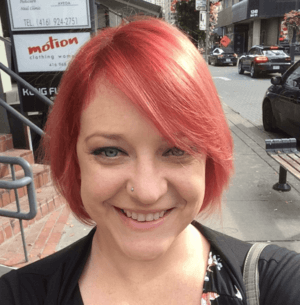Renée Hložek facts for kids
Quick facts for kids
Renée Hložek
|
|
|---|---|

Renée Hložek in Toronto, October 2019
|
|
| Born | 15 November 1983 |
| Alma mater | University of Cape Town University of Oxford |
| Scientific career | |
| Institutions | University of Toronto Princeton University |
| Thesis | Probing the early universe and dark energy with multi-epoch cosmological data |
| Doctoral advisor | Jo Dunkley |
Renée Hložek (born 15 November 1983) is a brilliant scientist from South Africa. She is a Professor of Astronomy & Astrophysics at the Dunlap Institute for Astronomy & Astrophysics at the University of Toronto. She is also an Azrieli Global Scholar with the Canadian Institute for Advanced Research. Renée studies big questions about the universe. She looks at the cosmic microwave background, which is like an echo from the early universe. She also studies special exploding stars called Type Ia supernova and patterns in how galaxies are spread out, known as baryon acoustic oscillations. Her important work has earned her awards like the Sloan Research Fellowship in 2020 and the Rutherford Memorial Medal from the Royal Society of Canada.
Contents
Early Life and Studies
Renée Hložek started her journey by studying mathematics. She attended the University of Pretoria and the University of Cape Town in South Africa. She finished her studies there in 2008. During this time, she began to explore the mystery of dark energy. After her studies in South Africa, she moved to the University of Oxford in the United Kingdom. She was a Rhodes Scholar there and earned her PhD in 2011. Her PhD research focused on understanding the early universe and dark energy. She used data from powerful telescopes like the Atacama Cosmology Telescope and the Sloan Digital Sky Survey. Her main advisor for her PhD was Jo Dunkley.
Exploring the Universe
Early Research
After getting her PhD, Renée Hložek moved to Princeton University in the United States. She worked there as a postdoctoral research fellow. At Princeton, she helped prepare for the Atacama Cosmology Telescope. This telescope is designed to measure special light from the early universe. In 2012, she became a Spitzer-Cotsen Fellow at Princeton. While at Princeton, Renée also worked to help others. She took part in a program that taught in prisons. She also helped create the Hope-Princeton exchange. This program aimed to bring young Black women into astronomy departments at Princeton.
Current Work and Discoveries
In 2016, Renée joined the Dunlap Institute for Astronomy & Astrophysics. She continues her work with the Atacama Cosmology Telescope. She also uses information from other important space missions. These include Planck, Wilkinson Microwave Anisotropy Probe, and BICEP and Keck Array. She is trying to find and classify fast radio signals using the Algonquin 46m radio telescope. Renée has also worked with the Perimeter Institute for Theoretical Physics. In 2017, she participated in the Canadian Institute for Advanced Research's "Untangling the Cosmos" event. Her contributions to science have been recognized with several awards. In 2019, she was named a CIFAR Azrieli Global Scholar. She received a Sloan Research Fellowship in 2020. In 2024, she was awarded the Rutherford Memorial Medal. She is also the Spokesperson for the Vera C. Rubin Dark Energy Science Collaboration (DESC).
Sharing Science with the World
Renée Hložek is also passionate about sharing science with everyone. She was named a TED Fellow in 2012 and a Senior Fellow in 2014. Her educational video for TEDed, titled "The death of the universe," has been watched over a million times. She has given talks at several TED events. This includes the 2014 TED conference in Vancouver. Renée is very active in programs that encourage more girls and women to pursue careers in science. She believes it is important to have a good balance of genders in scientific fields.
See also
 In Spanish: Renée Hložek para niños
In Spanish: Renée Hložek para niños
 | Selma Burke |
 | Pauline Powell Burns |
 | Frederick J. Brown |
 | Robert Blackburn |

